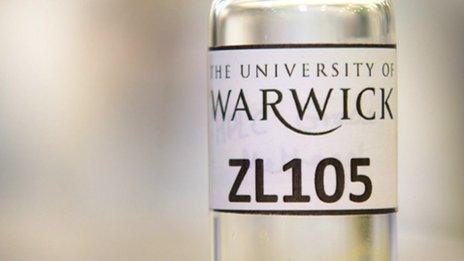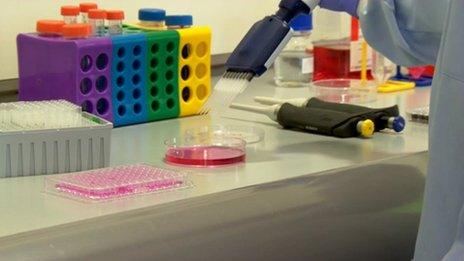Chemists create new way to fight drug-resistant cancer
- Published
- comments

University of Warwick chemists are hoping ZL105 will provide a new cancer treatment
Chemists at the University of Warwick have created a cancer drug that kills tumours in an entirely new way.
They hope it could one day help patients who have developed an immunity to a common chemotherapy drug called Cisplatin.
Cisplatin was actually discovered by accident. In the late 1960's Dr. Barnett Rosenberg at Michigan State University was experimenting on bacteria with electricity.
He was surprised to see the bacteria in his petri dish starting to die. More research showed that the platinum electrodes he was using to pass the electrical current had created a chemical that killed the bacteria. A chemical he realised could be used as a cancer treatment, Cisplatin, external.
DNA kink
It works by introducing a kink into the DNA, external inside the cancer sells which the cell doesn't recognise and so it self-destructs. Healthy cells on the other hand are better able to repair the kink and so are mostly unaffected.

Chemists are looking for new drugs to stop cancer
But, eventually, it is possible for cancers to learn to copy the healthy cells and deal with the drug-induced kink in their DNA. At that point the cancer becomes drug resistant. This is bad news for patients of course. For ovarian cancer patients who relapse and need further chemotherapy around 80% will have cancers that are resistant to Cisplatin.
So at the University of Warwick chemists are looking for new drugs to stop cancer and there's nothing accidental about their latest discovery.
While Cisplatin has one way to kill a cancer cell, introducing a kink to the DNA, this new drug has ten. The thinking is that if this new drug, ZL105, has many more ways to destroy a cancer cell then it will be almost impossible for the cancer to develop resistance.
Cancer cell killer
In very simple terms ZL105 works by causing the power centre of the cell to overload, destroying the cells. In the lab it has killed a variety of different cancer cells including cells from cancers resistant to Cisplatin.
It's also hoped that ZL105 will be more potent than existing drugs which means patients could need lower doses. And that means patients would in theory suffer fewer side effects.
All this is very promising but we're at least ten years away from a drug we can actually use in patients.
It is possible of course that ZL105 could fail at some scientific hurdle further down the line before it even reaches a hospital. Many promising new drugs don't make it from lab to patient. But for the chemists at the University of Warwick these results are a sign their new ideas about treating cancer are producing promising results.
And rather than an lucky accidental drug discovery this is a focused search that will hopefully produce a useful and radically new cancer treatment.
Edit: Just got the link for the paper about this research. Should be live shortly. Click here , externalfor more.